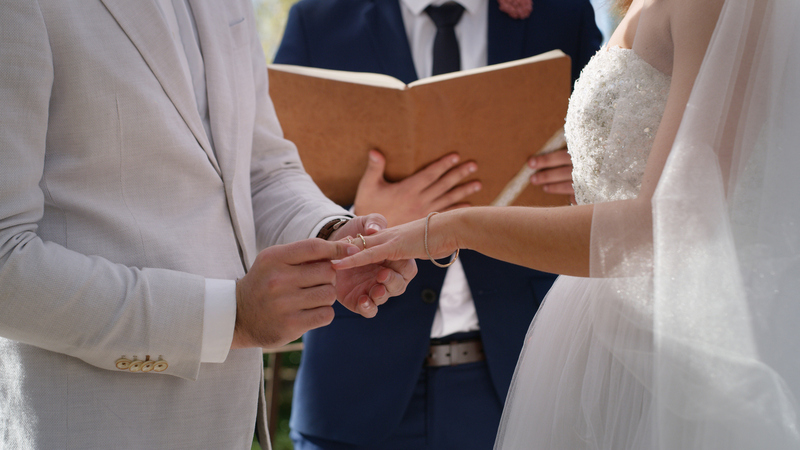AMERICAN WEDDINGS BLOG
Stay up to date with the latest wedding ceremony trends, script writing inspiration, tips and advice for first-time officiants, and news that matters to couples and wedding ministers.
Stay up to date with the latest wedding ceremony trends, script writing inspiration, tips and advice for first-time officiants, and news that matters to couples and wedding ministers.
Published Wednesday, Jan. 5th, 2022
Last updated Thursday, Aug. 1st, 2024

Listen now:
Everyone makes mistakes – even wedding officiants! We’re only human, after all.
Still, there are a few things a wedding officiant should never do on the wedding day – from saying the wrong name, to sharing an embarrassing story, to showing up ten minutes after the wedding is supposed to start. (Talk about a wedding fail!)
If you’ve been asked to officiate a wedding for a close friend or family member, or you’re a professional officiant looking to fine-tune your ceremony style, we recommend you take these 10 tips to heart.
Not ordained to officiate your first wedding yet?
Next, read Wedding Officiant Do's & Don'ts and learn the basic Wedding Ceremony Outline.

Photo: nicoletaionescu / iStock
Officiants: Don't let these wedding mishaps happen to you!

Uh oh! Plan to arrive at the wedding venue about an hour early.
There are so many factors that can make us run late on the wedding day! Bad traffic, re-routes or accidents, flat tires, sudden illness or upset stomach, and countless other unexpected events.
To avoid showing up late, plan to arrive at the wedding venue at least one hour before the ceremony, and check the weather, road conditions, and route the day before. Once you arrive at the venue, check in with the wedding planner, organizer, or couple to let them know you’re there, and then relax. This will reduce everyone’s stress level!
Oh boy, this is actually one of the easiest mistakes to make on the wedding day – especially if you’re reusing an old script, have just met the couple, or are officiating more than one wedding on the same day.
To avoid this, practice names that are difficult for you to pronounce, try to commit the couple’s name to memory, and always double check the full legal spelling of names before you fill out a marriage license.
Always ask a couple whether or not they want their ceremony to incorporate a specific faith or faiths before choosing or writing their wedding ceremony script. Unless you know for sure that religious language is ok, avoid words like ‘God,’ ‘covenant,’ or ‘holy’ (as in holy matrimony), and any quotes or readings from religious texts. This goes for ‘spiritual but not religious’ quotes, too.

Hmm, is this wedding story appropriate for *all* audiences?
If you’re officiating for a close friend or family member, you might want to personalize the ceremony with a few funny anecdotes or stories to liven things up. This can backfire if you’re not careful, by revealing too-personal information, embarrassing someone, or taking attention away from the couple.
Ask the couple if they prefer a funny or formal ceremony, and get any jokes or personal stories approved before the wedding day. And if they decide on a lighthearted, funny ceremony, remember this is still their show, not yours. Don’t go overboard.
It’s natural to talk too much or too fast when you’re nervous, but timing is essential to a seamless ceremony. Take time to practice the ceremony script out loud (with a timer!) before the wedding day.
Remember: No one wants to sit through a long winded speech on the pros and cons of marriage – if your ceremony script is so long that guests need a bathroom break, edit that thing down! The opposite is also true – a wedding ceremony is a meaningful ritual and marks an important milestone in a couple's relationship, so don’t rush it.
We think a great length for a ceremony is about 15-20 minutes, but the ‘perfect’ length will be whatever the couple wants.
Some families have more drama than others, and you never know where this outdated question might lead. Before you ask guests to “speak now or forever hold” their peace, ask your couple if they want this in their ceremony. If they do, there are always humorous ways to include it, such as, “If anyone here knows of any reason why these two should not be married… you better mind your own business.”
Many traditional wedding elements have gone out of style over time. Some of these, like ‘giving away’ a bride or asking a partner to ‘obey’ their spouse might be offensive if they go against a couple’s values or personal attitudes toward marriage, or simply not apply. (While other couples might find them sweet!)
To avoid writing a ceremony script with the wrong tone, always ask the couple if there are any traditions or words they’d like you to leave out.

What vibe is your couple going for?
Some couples love PDA, while others cringe at anything more intimate than a kiss on the cheek in public. In the same way, not all couples are into flowery romantic language, while others LOVE it!
Try to match the tone and vibe a couple uses when describing their relationship to you – Is your couple an “until death do us part” or a “now and in the future” kind of couple? Are they “soulmates” or “partners”? And keep in mind that they may act and speak differently around family members than they do around you (especially if you’re officiating for a friend!).
This one might seem obvious but it’s worth including. If you want to get someone’s attention from across the room (for example, a member of the wedding party who’s wandered away), wave discreetly or ask another guest to walk over to them.
If someone interrupts, heckles, or tries to cause a scene, keep your voice calm and carry on. Raising your voice will only raise the tension, too, and kill the mood.
This is the most important item of all! Making sure that the marriage license is completed and signed is the primary legal responsibility of any wedding officiant. Several states also require the wedding officiant to return the completed license to the county or city clerk. It can be easy to get swept up in the excitement after the ceremony is over, especially if everyone is in a hurry to get to the reception.
Make sure you, your couple, and any required witnesses sign the license before heading to the next activity!

Don't forget to sign the marriage license!
Have fun! And remember what this day is all about – the happy couple and their new marriage.
Looking for creative officiant scripts and templates?
Visit AMM's Wedding Ceremony Script Library!
We know that writing a ceremony from scratch can be a daunting process, especially if you’re officiating on short notice.
To make things easier, we keep our Sample Wedding Ceremony Scripts Library well stocked with wedding ceremony templates and sample scripts for you to choose from. These scripts are a great starting point, with sections to add to, leave out, or reorganize, as you personalize a ceremony.
You'll find a variety of religious and non-religious ceremonies to choose from.

Wedding officiants read from a script during the ceremony so that they don't forget what to say or what part comes next. A wedding ceremony script can be prewritten (a standard wedding script) or personalized with details from the couple's unique love story.
Become a Wedding Officiant with Our Free Online Ordination!